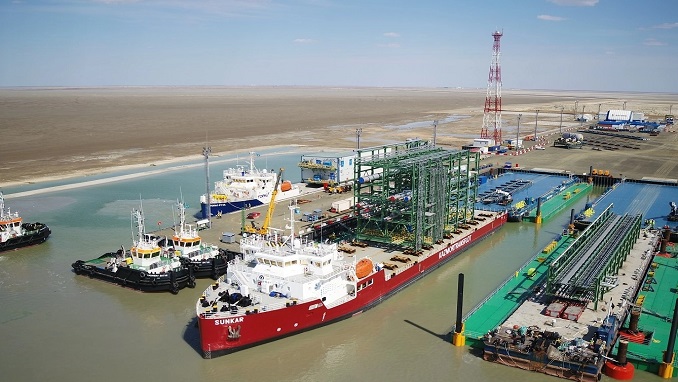The volume of Kazakhstan’s crude oil deliveries through a pipeline running from Azerbaijan to Turkey is projected to reach up to 125,000 tons in April following the successful test consignments this month of oil from Kazakhstan transiting across the Caspian Sea into the pipeline.
However, even at that rate, Kazakhstan is set to fall short of its earlier declared full-year target of pumping 1.5 million tons of its oil through the Baku-Tbilisi-Ceyhan pipeline.
Earlier this week, Kazakh oil transportation company KazTransOil delivered almost 10,000 tons of crude from the Tengiz field in the maiden consignment from the port of Aktau on an Azerbaijan-owned tanker that was to dock in the port of Baku.
Another 10,000 tons of crude from the Tengiz field, which is being developed by a joint venture co-owned by US oil giant Chevron, is due for delivery by the end of this month.
The company previously announced its plans to send with INPEX North Caspian Sea, Ltd, which is registered as the shipper of Kashagan oil, a trial shipment of 7,000 tons of crude from the Kashagan field to the Port of Aktau for further delivery to the Port of Baku.
As part of growing efforts to find export routes bypassing Russia, Kazakhstan’s PM Alikhan Smailov announced late last year Kazakhstan’s plans to start transporting 1.5 million tons of oil via Azerbaijan, through the Baku-Tbilisi-Ceyhan pipeline, in early 2023 with projections to increase, in time, annual shipments via the pipeline to 6-6.5 million tons.
However, the earthquakes in Turkey in early February shortly put a pause on Kazakhstan’s experiment to substantially boost its non-Russia-transiting oil exports due to the temporary suspension of loading operations at the Ceyhan sea terminal.
The natural disaster also suspended the export of oil from the port of Aktau to Baku with further transportation through the Baku-Tbilisi-Ceyhan oil pipeline, which means that if Kazakhstan maintains April’s export tempo throughout 2023 the amount of crude delivered via Baku-Tbilisi-Ceyhan will approach 1.15 million tons.
Before the war in Ukraine, more than two-thirds of Kazakhstan’s oil exports were sent to Europe via Russia but, since then, the country has put a heavy emphasis on developing the capacity of the so-called Middle Corridor.
Although he didn’t specify a timeframe to reach that goal, Kazakh President Kassym-Jomart Tokayev said in November that the volume of crude transported through Aktau and Kuryk – the two Kazakhstani ports – and along the trans-Caspian route would eventually reach up to 20 million tons per year.
In 2022, as figures produced by state holding company Samruk-Kazyna show, more than 80% of Kazakhstan’s oil exports – around 64.3 million tons- were carried through the Caspian Pipeline Consortium route – which starts at Tengiz and runs across Russia- 13% was fed into Russian state-controlled Transneft’s network via the Atyrau-Samara pipeline and another 3.6% was sent by sea from Aktau to the Russian port city of Makhachkala.
Over the same period, only 109,000 tons of Kazakh crude fed into the Baku-Tbilisi-Ceyhan pipeline as a result of bottlenecks in the route rather than restricted capacity at Kazakhstan’s Caspian ports which were operating at only 23% of potential capacity last March, as the Kazakh industry and infrastructure development minister complained.



